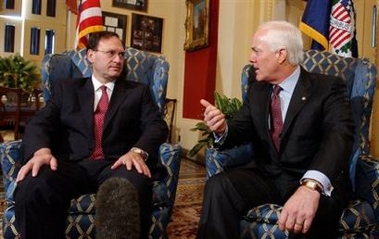|
Poll: Early public support for Alito weak
(AP)
Updated: 2005-11-05 19:10
Early support for Supreme Court nominee Samuel Alito is
considerably weaker among such key groups as evangelicals, Republicans and the
wealthy than it was for John Roberts, an AP-Ipsos poll found.

Judge Samuel Alito, left, meets with Sen. John
Cornyn, R-Tex., on Capitol Hill Thrsday, Nov. 3, 2005, to discuss Alito's
nomination to the Supreme Court. [AP] |
The survey put public sentiment for Alito closer to the level of early
backing for the failed nomination of Harriet Miers.
About four in 10 respondents — 38 percent — say they back the confirmation of
Alito, a federal appeals court judge from Philadelphia. Twenty-two percent say
they strongly support him.
For Roberts, now the chief justice, 47 percent said in July that they
supported his confirmation, 36 percent strongly.
Almost two-thirds of evangelicals supported Roberts' confirmation with half
strongly backing him. For Alito, about half of evangelicals support his
confirmation, one-third strongly. There were similar drops among Republicans and
among people who make more than $75,000 a year.
Alito's selection followed the implosion of the Miers nomination, which could
leave some people slow to embrace President Bush's latest nominee, said
presidential scholar Charles Jones, a senior fellow at the Brookings
Institution.
"That has led to a hesitancy among some Republicans, conservatives and
evangelicals," Jones said. "The Miers experience really raised doubts about the
president and his judgment, it's more of a wait-and-see."
Despite Bush's call for the Senate to confirm Alito by the end of December,
the Senate put off hearings until Jan. 9, giving Judiciary Committee
investigators and the public more time to delve into his background and record
as a judge.
"I don't know enough about him to have an opinion," said Ann Clark, who lives
near Reading, Pa., and leans Republican. "I want to make sure that he's
compassionate toward the working class and the middle class."
The nomination of Alito comes at a pivotal time for the Supreme Court. He is
a solidly conservative judge who will be replacing Sandra Day O'Connor, a
moderate swing vote on the court who helped guide decisions on contentious
issues like abortion, affirmative action and religion.
One in five Democrats say Alito should be confirmed to the court, and twice
as many, 41 percent, say he should not be.
"I'm worried that he is going to vote against women's rights," said Elizabeth
Gardner a Democratic-leaning resident of Wellesley, Mass. "If women don't have
the right to choose, then they're no longer equal."
A solid majority of Americans oppose overturning the landmark case legalizing
abortion, but polls have found most willing to support some restrictions.
White House spokesman Steve Schmidt said he's confident "the American people
will be very comfortable with Judge Alito as he moves through this process."
If Alito wins confirmation, he will become the fifth Roman Catholic on the
court, the most ever. Although evangelical Protestants historically have been
wary of Catholics, relations between the two groups have warmed in recent years
because of shared concerns over abortion and the declining role of religion in
American life.
For Patricia Carter, an evangelical from Roland, Okla., the most important
factor is that Alito is "a Christian, a conservative and the choice of President
Bush."
"What I've heard about him I like," she said. "If the Democrats don't like
him, he's got to be good."
The telephone poll of 1,006 adults was conducted Oct. 31-Nov. 2 by Ipsos, an
international polling firm and has a margin of sampling error of plus or minus 3
percentage points, larger for subgroups.
|